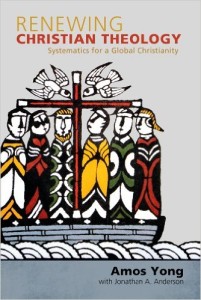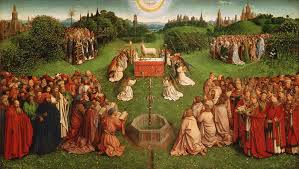Renewing Christian Theology
Amos Yong’s new book, Renewing Christian Theology: Systematic for a Global Christianity, is simply excellent!
Yong is among the leading Pentecostal theologians at work today, if not the leading Pentecostal theologian. The breadth and depth of his theological work is, as far as I know, unparalleled.
In this book, Yong uses a broader moniker, however, to capture the diverse spiritual fervor and theological reflection often associated with Pentecostalism: “renewal theology.”
Yong reminds/informs readers of the diversity of faith and thought expressions across the planet, including the diversity. What unites this diversity is the quest for Christian renewal, says Yong, but renewal that itself should be open to further renewal.
Few theologians could pull of a book that seeks to identify scholarship across the globe. But Yong is so well connected with renewal-oriented scholars and so well read that he does an amazing job in this book. References to scholarship riddle the book’s chapters, a tribute to Yong’s diverse interests and stature as a leading renewal theologian of our day. These references also include scholarship far beyond renewalist thinkers. Several times while reading I found myself in awe of Yong’s expansive interests.
A unique feature of the book is the collection of art photos sprinkled throughout. These artistic pieces are meant to illustrate or deepen reflection of the particular topic at hand. It’s a creative idea!
Descriptive of Prescriptive?
After reading the introductory chapter describing the global context of renewal theology, I had the sense that the book would be primarily descriptive. Yong informs the reader that he would begin each chapter with a World Assemblies of God Fellowship doctrine of faith. After a brief reflection on a biblical passage or story to begin each chapter, Yong tells readers he plans to show how voices across the world interpret, expand, or are compatible with the doctrine addressed in the chapter.
In a move uncharacteristic of systematic theologies, Yong begins his book with eschatology. The chapter is titled “The Last Days and the End of Time,” and this caught my attention not only for its reversal of typical ordering but also for what it says theologically. I love even more that Yong puts the doctrine of scripture last in the book, illustrating rightly the proper place of Scripture relative to the major doctrines of the church. Creative moves such as these should jar readers toward new insights and novel reflection. I applaud Yong for such moves!
As I read the Global Assemblies of God Fellowship statement on eschatology and then each Assemblies doctrine in the chapters thereafter, however, I discovered my expectations for Yong’s project were misplaced. Perhaps I read too much into the introduction. Instead of an entirely descriptive account of renewalist reflection related to the Assemblies statements, I found Yong’s theological commentary in each chapter considerably different from the wording and usual interpretation of the Assemblies of God statements.
The eschatological statement begins with statements about millennialism. It preaches purification in readiness for the return of Jesus. And it affirms everlasting conscious punishment for those not in the book of life. These claims are not what I’d personally propose for a statement about eschatology, and I’m glad I’m not a member of the Assemblies of God Fellowship so that I would be expected to affirm them. And other Assemblies statements of faith would not be winsome to most contemporary theologians I know.
I’m not complaining that Yong doesn’t simply follow the Assemblies doctrine and descriptively tell the reader what that entails in relation to other renewal thinking. Nor am I complaining that the views Yong proposes seem sometimes only loosely associated with the statements. I’m not complaining, because I do not find the Assemblies of God Fellowship statements attractively worded. The substance of some statements also strikes me as unhelpful. These statements have wording that may have been in vogue a half century ago or more. But the wording is stilted and unhelpful to many today.
If Yong’s views are the heart of renewal theology, count me among renewal theologians! Click To TweetIf Yong’s prescriptive views in these chapters are the heart of renewal theology, however, count me among renewal theologians!
Conclusion
I have written a longer review of Amos’s book, which will be included in an upcoming Evangelical Review of Theology. My review focuses upon the longest chapter in Renewing Christian Theology. That chapter addresses creation and fall, including natural history and God’s redemption.
Let me conclude here by saying that Amos Yong is a trailblazing theologian. This book is an amazing contribution to theology in general and renewalist theology in particular. He is at the center of much good and exciting work, as Christians today seek to answer well the puzzling questions of our time.
Serious theologians must read this book!
Amos Yong is a trailblazer. Renewing Christian Theology is a must read for serious theologians! Click To Tweet
Comments
The sheer amount of exclamation marks shows how truly exciting this book is to you. I’m glad Amos Yong is getting more attention these days,
If this text were to be used as a text book what level would it be suitable for? Undergrad? Grad? PhD?